Female Prisoner In Iran Calls For Overthrow Of Regime
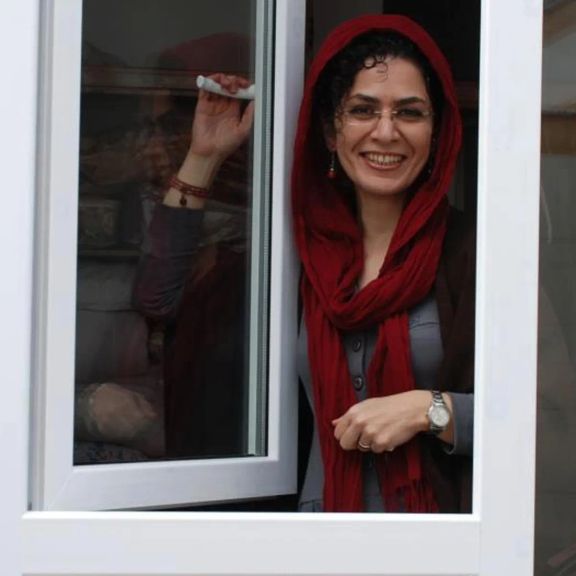
Jailed women's rights activist Bahareh Hedayat says the Iranian regime must be overthrown adding that if Iranians want freedom they must oust the Islamic regime.

Jailed women's rights activist Bahareh Hedayat says the Iranian regime must be overthrown adding that if Iranians want freedom they must oust the Islamic regime.
In a letter sent from prison and published by Iranwire, Hedayat referred to the killing and execution of youths during the nationwide protests against the Islamic Republic, stressing that she has faith more than ever that victory can be won.
"The Islamic Republic has become the most immoral element in Iranians' daily life and its survival is the negation of our survival, our children and our land, therefore demanding its ouster still makes sense,” underlined Hedayat.
This is not the first time that Hedayat calls for the overthrow of the Islamic Republic from prison.
Earlier and during the popular uprising against the Islamic regime she explained the difference between the protests following the death of Mahsa Amini and previous protests saying that people detached themselves from political and regime-made Islam this time.
Hedayat was one of the activists who worked on the One Million Signatures campaign to change laws that discriminate against women in Iran. She has been arrested and imprisoned several times.
She was arrested by security forces in Tehran on October 11, 2022, amid the Mahsa Amini protests. After eight days of detention, in a phone call, she informed her family that she was in ward 209 of Evin prison and did not know the reason for her arrest, nor the charges against her.

The Iranian government has proposed to Saudi Arabia three locations for a meeting at foreign minister level, since the countries agreed to re-establish ties.
Iranian Foreign Minister Hossein Amir-Abdollahian told a news conference in Tehran his country had agreed to such a meeting, although he did not list the three locations or say when such a meeting might take place.
Separately, an aide to Iranian President Ebrahim Raisi said that Saudi Arabia's King Salman bin Abdulaziz had invited Raisi to visit Riyadh in a letter welcoming the deal agreed on March 10 to restore ties within two months, after years of hostility.
Raisi "welcomed the invitation," Mohammad Jamshidi, political deputy at the president's office, said on Twitter without mentioning a timeframe.
Iran’s regime pressed by domestic unrest and a deep economic crisis seems determined to improve regional ties and reduce its international isolation. Nuclear talks with the United States that could lift crippling sanctions and lessen pressure have stalled with no immediate sign of a breakthrough.
The Saudi government's communications office did not immediately respond to a Reuters request for comment. Saudi state media has not reported on the letter.
The deal between the region's Sunni Muslim and Shiite powers, brokered by China, was announced March 10 after four days of talks in Beijing between top security officials from the two rival Middle Eastern powers.
Amir-Abdollahian also said Tehran was ready for the mutual reopening of embassies.
Saudi Arabia cut ties with Iran in 2016 after its embassy in Tehran was stormed during a dispute between the two countries over Riyadh's execution of a Shiite Muslim cleric.
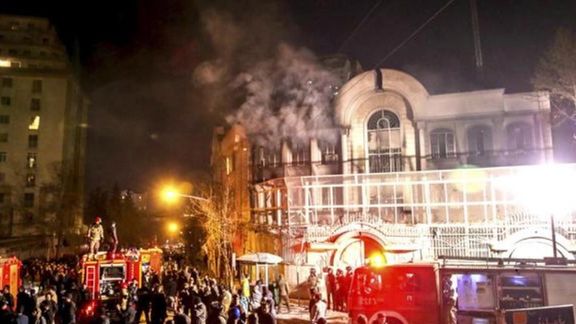
Amir-Abdollahian said Iran also hoped steps would be made to normalize its ties with Bahrain, a close Saudi ally that followed Riyadh in severing diplomatic ties with Iran in 2016.
Bahrain, a Sunni Muslim-ruled monarchy with a majority Shiite population, has repeatedly accused Iran of fomenting unrest in the island state, which Tehran denies.
"An agreement was reached two months ago for Iranian and Bahraini technical delegations to visit the embassies of the two countries. We hope that some obstacles between Iran and Bahrain will be removed, and we will take basic steps to reopen the embassies," Amir-Abdollahian said.
Bahrain's government communications office did not immediately respond to a Reuters' request for comment.
Bahrain, together with other Gulf Arab states, welcomed the agreement between Riyadh and Tehran to restore relations.
Iran’s national security chief Ali Shamkhani, an old IRGC hand, visited the United Arab Emirates Thursday and met with members of its top leadership. However so far, there is no concrete information about details of the discussions in the UAE and Iranian media.
IRNA, the official Iranian government news agency, said Shamkhani’s visit showed that once Tehran and Riyadh embark on rapprochement, Saudi allies would follow and “foreign influence” will be reduced in the region, implicitly referring to the United States.
Shamkhani met with UAE President Sheikh Mohammed bin Rashid and ruler of Dubai and other top officials. “Their talks covered regional and international issues of mutual concern, and the importance of working to support peace and co-operation in the region to enable progress and prosperity for its people,” state news agency Wam reported.
With reporting by Reuters
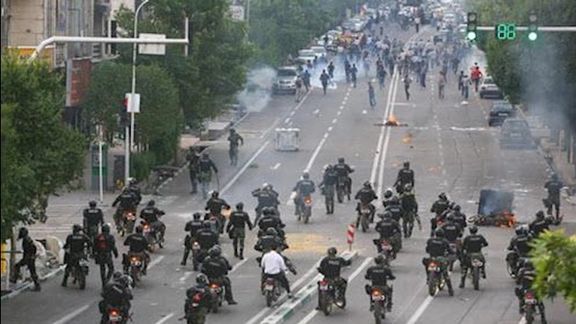
Iran's strategic gasoline reserves have dropped to five-days’ supply, forcing the government to consider a new fuel management plan and precautions to prevent possible unrest.
Iran International has acquired a classified document outlining the proceedings of a meeting of various government officials from different departments at the presidential office in late February according to which strategic fuel reserves have dropped to a dangerously low level, forcing major repairs at refineries to be delayed to allow maximum production for the time being.
The document sent to the president and a host of other officials including the chief justice and parliament speaker, as well as heads of the military and law enforcement forces refers to the imbalance in gasoline production-usage levels as a “serious issue”.
Participants in the meeting decided that the oil ministry, which is apparently drawing up the new plan, should offer assurances to the public that it will help maintain the supply of fuel at normal levels. The meeting decided to advise officials to avoid any public remarks or suggestions that could be interpreted as an intention to raise current fuel prices.
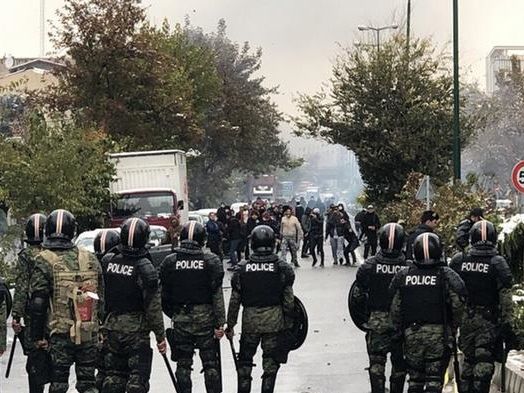
Details of the new fuel usage management plan have not been mentioned in the document.
There have been several reports in recent months that Iran’s refineries face technical problems and they operate below normal levels. Lack of foreign currency, US sanctions and insufficient natural gas supplies are all reasons impeding full operational capacity.
The report also includes several suggested measures, including controlling domestic media reporting on the issue and containing the consequences of enforcing the plan amid the many economic troubles that Iranians are currently facing.
In November 2019, the announcement of the government’s decision to increase fuel prices by 50–200 percent triggered a cycle of protests and unrest across the country that lasted for over two weeks. During this time, angry protesters torched hundreds of gas stations, banks, and government buildings.
Gas station torched by protesters in Eslamshahr to the south of the capital Tehran, November 2019.
Security forces heavy-handedly suppressed the protests amid a week-long internet shutdown. The crackdown was the most violent since the Islamic Revolution of 1979. The month of Aban in the Iranian calendar during which the protests occurred is now often referred to as “Bloody Aban”.
Thousands including journalists were arrested. The government never officially reported the death toll but as many as 1500 were killed according to unofficial reports.
Daily gasoline consumption has risen to 104 million liters from 82m liters before the pandemic, the report says, adding that usage is expected to rise to between 120m and 130m during the New Year holidays (late March and early April).
While the representative of the Central Bank of Iran in the meeting attributed the increased fuel use to smuggling to neighboring countries, a representative of the Economic Security Police blamed high fuel use of domestically produced vehicles and recommended an increase in production.
The meeting focused on the fuel supply issue but some other economic topics such as controlling the foreign exchange market were also discussed. According to the report, the meeting tasked security and judiciary bodies with controlling the media coverage of these issues.
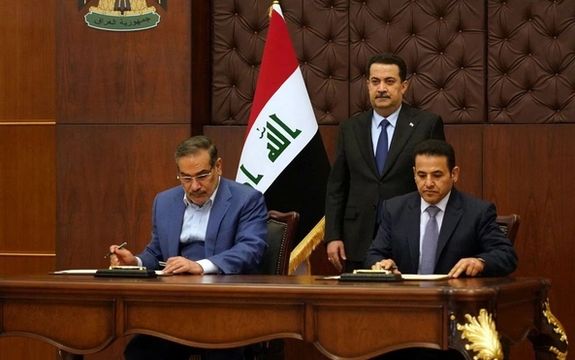
Iran’s top security official signed an agreement with his Iraqi counterpart Sunday in a deal aimed at curbing activities of Kurdish militants.
The secretary of Iran’s Supreme National Security Council (SNSC) Ali Shamkhani and his Iraqi counterpart, Qassim al-Araji inked the joint security cooperation document during a ceremony also attended by Prime Minister Mohammed Shia' Al Sudani in Baghdad.
A statement from the Iraqi prime minister's office said that the joint security agreement includes coordination in "protecting the common borders between the two countries and consolidating cooperation in several security fields."
A spokesperson said, "Under the signed security deal, Iraq pledges it will not allow armed groups to use its territory in the Iraqi Kurdish region to launch any border-crossing attacks on neighbor Iran."
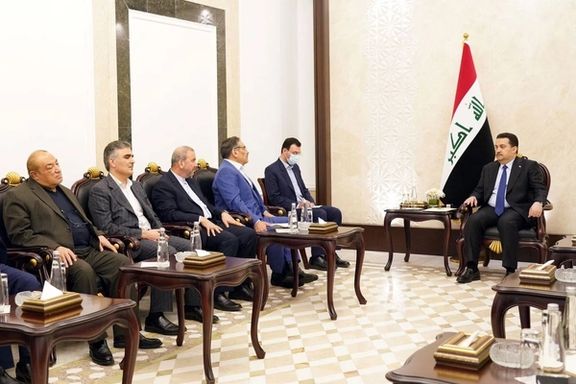
The frontier came into renewed focus last year when Iran's Revolutionary Guards launched missile and drone attacks against Iranian Kurdish groups based in northern Iraq, accusing them of fomenting protests that were sparked by the death of an Iranian Kurdish woman, Mahsa Amini, while she was being held in morality police custody.
Nour News, a media outlet close to the SNSC, said earlier in the day that the deal would facilitate efforts to deal with problematic Kurdish groups that coordinate measures against the Islamic Republic along with Israeli agents and armed insurgents.
The Islamic Republic calls Iranian Kurdish armed groups sheltering in Iraq, "terrorist groups" but these groups say that the goal of their armed campaign is "defending the rights of the Kurds".
Generally, the Kurdish parties − including Komala and the Kurdistan Democratic Party of Iran (KDPI) − favor Kurdish autonomy within a federal Iran. Pejak (the Free Life Party of Kurdistan), an affiliate of the Kurdistan Workers’ Party, or PKK, formed in Turkey but also based in northern Iraq, has generally favored a unified, independent Kurdistan uniting Kurds in Syria, Iraq, Turkey, and Iran.
Shamkhani is also scheduled to hold talks with Masrour Barzani, the Prime Minister of the Iraqi Kurdistan Region, on the issue of border security.
Shamkhani and the Iranian delegation also paid a visit to the site where IRGC’s Quds (Qods) force commander Qassem Soleimani and Abu Mahdi al-Muhandis, the second-in-command of Iraq’s Popular Mobilization Units, were killed by a US drone attack three years ago.
Iran claims that US interference in the region has been creating regional unrest, its sanctions driving a domestic crisis. Shamkhani said this "can no longer be tolerated".
During the meeting with his counterpart, Shamkhani acknowledge the role played by the Iraqi negotiating team which, along with Oman and China, brokered a détente between Tehran and Riyadh.
Shamkhani's trip to Baghdad follows his landmark trips to China and the United Arab Emirates earlier this month as part of the Islamic Republic’s renewed zeal to revive ties with regional neighbors and deepen relations with its global allies, indicating that Supreme Leader Ali Khamenei is relying more on his representative for high-profile missions than the country’s Foreign Minister Hossein Amir-Abdollahian. The Secretary of the Supreme National Security Council is nominally appointed by the president, but he also serves as Khamenei’s representative in the Council.
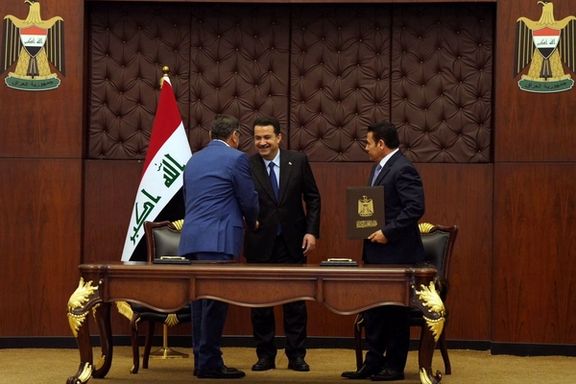
Khamenei’s decision to send Shamkhani to Beijing showed that in serious matters he needs a more qualified official than hardliners populating the current presidential administration. In fact, Rouydad24, a reformist news website in Tehran pointed out Saturday that hardliners have been trying to tarnish Shamkhani’s image, by leaking information that one of his former aides, Alireza Akbari, was executed in January for espionage. Rumors also circulated in February and March that he was about to be dismissed following the news about his aide. As a close ally of former President Hassan Rouhani, hardliners would like to see an ultra-conservative take over the key role which critics say he retained due to his being a member of Khameini's trusted circle.
Although the 83-year old dictator made sure ultra-conservatives loyal to him take the absolute majority in parliament and the presidency in 2020 and 2021 respectively, he knows there are few qualified people among them, and at least in the realm of key foreign policy issues he makes sure his direct representatives are more balanced and experienced officials. This also brings up the question of why he entrusted the nuclear negotiations to people more associated with the ultra-conservatives.
In a move to assert his role, Amir-Abdollahian said on Sunday he will soon meet his Saudi counterpart Faisal bin Farhan Al Saud as negotiations to reopen embassies and consulates in the two countries, continue.
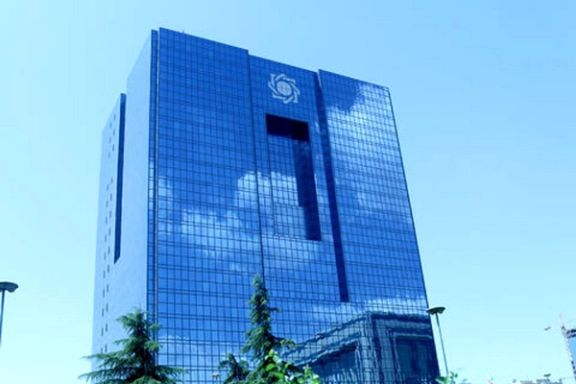
Iran's central bank claims that recent agreements with Saudi Arabia and the United Arab Emirates are already reaping financial rewards for the cash-strapped economy.
In a statement released Sunday, the Central Bank of Iran (CBI) said the growth in foreign currency availability made it possible to exchange about 630 million [UAE] dirhams, a huge boost to the country in the midst of a biting recession.
In a statement released at the weekend, the CBI said, “Tehran’s success in foreign policy and prioritizing relations with its neighbors, including the agreements with Arab countries, especially Riyadh and Abu Dhabi, has resulted in the foreign currency availability.
Renewed ties with Saudi Arabia and the UAE brokered this month, in addition to deals with other Persian Gulf Arab countries, have boosted interbank communication and produced tangible results that will complement the foreign exchange policies of the central bank.
The claims by the CBI come in the midst of a situation in which the rial lost further value against the US dollar on Sunday, reaching 500,000, raising doubts from skeptics that its claims of diplomatic and economic success may well be an attempt to simply prop up the rial.
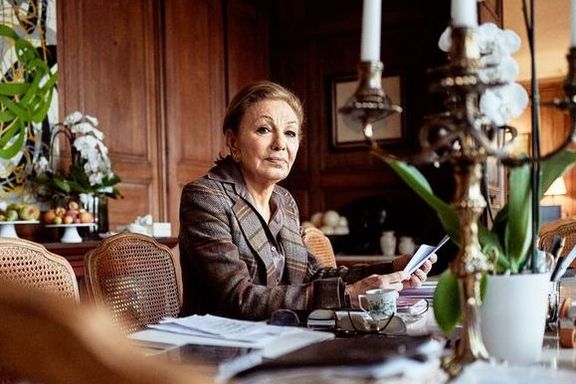
Iran’s exiled queen has expressed hope that Iran will be free in the coming year in a message on the occasion of Iranian new year, Nowruz.
Farah Pahlavi expressed sympathy with the families of the dead protesters, prisoners and people under pressure in Iran, saying that the essence of Nowruz heralds the victory of truth over lies.
"Nowruz, which always brings joy and hope, will be celebrated this year in a situation in which our nation is mourning its lost ones," she said.
The exiled queen further noted that hundreds of young men and women died with the slogan ‘Women, Life, Freedom’ in confrontation with brutality and darkness, but “their names and memories will be eternal in the history of Iran”.
She further underlined that “my thoughts are with the bereaved mothers and fathers, thousands of Iranians who are imprisoned, and teenagers who have been poisoned in Iranian schools”.
Elsewhere in her remarks, Pahlavi expressed concern over the situation of millions of Iranians who are struggling to earn a living and are victims of the brutality and incompetence of the regime.
She also congratulated the arrival of the ancient Iranian tradition Nowruz which is a “sign of stability, continuity and national identity.”
Iran has been witnessing nationwide protests within the past six months, during which time, regime agents have killed over 500 people so far and executed several who were arrested during demonstrations. Thousands more have been arrested arbitrarily.